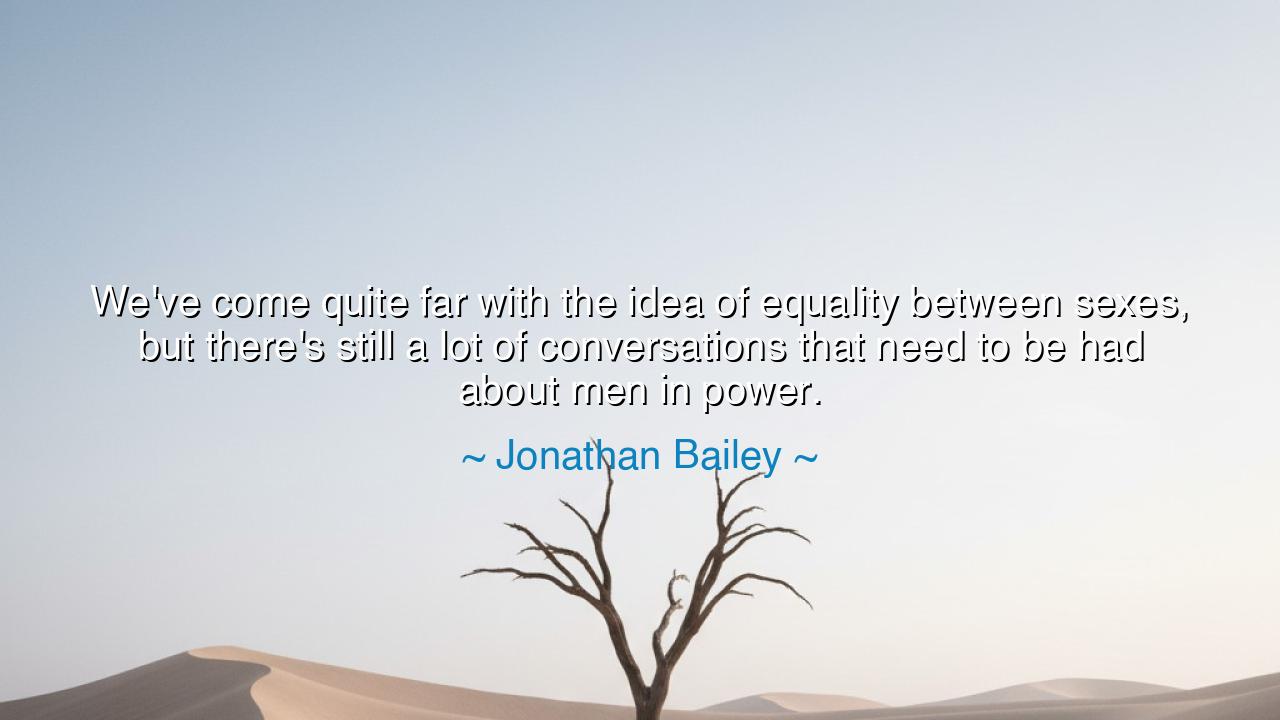
We've come quite far with the idea of equality between sexes, but
We've come quite far with the idea of equality between sexes, but there's still a lot of conversations that need to be had about men in power.






Jonathan Bailey speaks with both gratitude and warning in his words: “We’ve come quite far with the idea of equality between sexes, but there’s still a lot of conversations that need to be had about men in power.” This saying is like a torch in the twilight—bright enough to show how far we have walked, but clear in revealing how far the road yet stretches into the distance. It acknowledges progress, the victories already won in the long battle for dignity and fairness, yet refuses complacency. For while equality has advanced in word and law, the structures of power remain tilted, still shaped by centuries of imbalance.
To say we have come far is to honor the generations of women and men who fought for change. It recalls the voices of Mary Wollstonecraft, Sojourner Truth, and Emmeline Pankhurst, who raised cries against injustice when the world scorned them. It recalls the victories of suffrage, the opening of universities, the breaking of barriers in politics, science, and art. Yet Bailey reminds us that even with these triumphs, the conversation is not complete. True equality is not only written on parchment; it must live in the structures of society, in the distribution of power, in the unseen corridors where decisions are made.
When Bailey speaks of men in power, he names a shadow that has lingered for centuries: the domination of leadership, wealth, and authority by one sex. This is not to condemn all men, but to recognize the ancient imbalance that has too often silenced women’s voices and narrowed humanity’s vision. In every age, kings and emperors, councils and parliaments, guilds and armies were overwhelmingly male. And though progress has opened many doors, the chambers of power are still heavy with this old inheritance. Until the conversation confronts it openly, equality remains incomplete.
History gives us both warning and hope. Consider the tale of Cleopatra of Egypt, who, in a world ruled by men, rose as queen with brilliance and command. She negotiated with Rome’s greatest leaders, wielded power in her own right, and shaped the destiny of nations. Yet history often reduced her not to her wisdom but to her beauty, her love affairs, her image through the eyes of men. Her story is proof that even when women grasp power, the lens of patriarchy distorts their legacy. Bailey’s call for continued conversation is a call to resist these distortions, to reshape the narrative so that power is no longer gendered, but shared in truth.
The meaning of his words is also deeply practical: equality between sexes is not a destination already reached but a journey that demands vigilance. Without new conversations, progress stalls; without honest examination of how power operates, old hierarchies quietly rebuild themselves. His teaching is that silence is dangerous, for silence allows injustice to hide. Only in dialogue, in the courage to name what is uncomfortable, can balance be restored.
The lesson, then, is clear: do not mistake progress for completion. Celebrate victories, but do not let them dull the urgency of reform. Speak boldly about who holds power, how they wield it, and who remains excluded. Question traditions that still place men as default leaders, and create spaces where women’s voices are not tokens but pillars. The ancients taught that justice must be guarded like a flame; if left unattended, it flickers and fades. So too with equality—it must be tended with constant care.
Therefore, let each who hears these words take action. In the workplace, amplify women’s voices. In leadership, demand fairness in representation. In daily life, question your assumptions about authority, and teach children that power is not bound to gender but to wisdom, compassion, and skill. Do not shy away from the conversations about men in power, but embrace them, for they are the chisels that shape a fairer future.
Thus, Jonathan Bailey’s words become a guide for our age: honor the journey traveled, but keep walking; celebrate equality achieved, but demand equality yet to come. For only when the halls of power reflect the balance of humanity itself will the dream of true justice be fulfilled. And until that day, we too must press on, speaking, questioning, and building a world where power and equality stand side by side.






AAdministratorAdministrator
Welcome, honored guests. Please leave a comment, we will respond soon